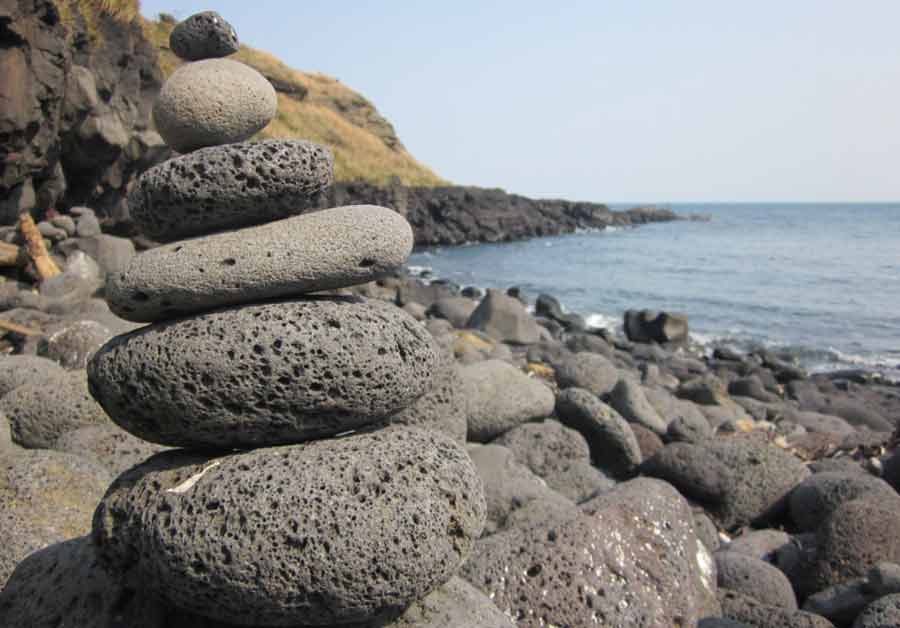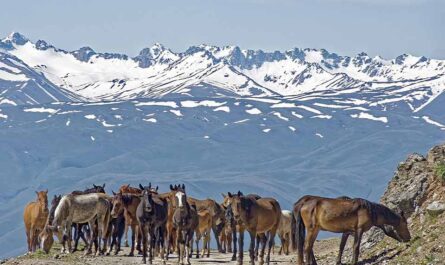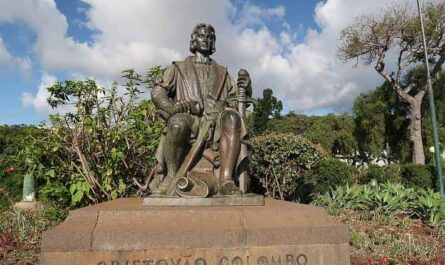Jeju Island, nestled in the embrace of the vast Korean landscape, unfurls a mesmerizing tableau of nature’s wonders. As your gaze stretches across the horizon, the panorama unfolds in hues of cerulean blue and lush green. The undulating hills of Jeju, draped in an eternal garment of greenery, generously scatter the golden effulgence of the sun, casting a warm blanket over the land. Every contour of the terrain whispers tales of timeless beauty, a spectacle that captivates the beholder. The wind, a gentle and constant companion, murmurs sweet melodies in your ears, a harmonious overture to the symphony of nature that envelopes Jeju Island. The air itself seems to carry the fragrance of adventure and discovery. To witness this captivating landscape is to immerse oneself in a visual poetry that transcends the ordinary.
Jeju Island, Korea
Nestled in the southern realms of South Korea, Jeju Island stands as a testament to the unparalleled beauty that the country has to offer. It is a place where nature unfolds its most enchanting panorama, weaving a tapestry of landscapes that range from majestic volcanic craters to lush green meadows. This island, located in the Korean Strait, is not merely a destination; it is a living testament to the diverse and dynamic ecosystems that flourish harmoniously on its shores. Let’s take a look at Jeju’s beautiful island:
1. Historical Origins of the Kingdom
In the annals of history, until the decline of the illustrious Jeju Joseon dynasty, this island paradise bore the grandiloquent title of the ‘Kingdom of the Tamana Kingdom.’ The nomenclature it embraced was as diverse as the cultural tapestry it wove – referred to alternately as Tamora, Seomra, Tamana, and Doi, each name carrying with it the weight of significance, akin to a poetic echo resonating through the corridors of time. The very essence of its identity, encapsulated in the phrase “island country,” manifested as a linguistic testament to its insular majesty.
2. Geological Genesis
Beyond the realm of human chronicles, Jeju’s genesis unfolds as a geological saga spanning an awe-inspiring two million years, a narrative etched in the lithic script of volcanic activity. The island, it is asserted, arose as a manifestation of the Earth’s fiery throes, a testament to the inexorable forces shaping the world. In the crucible of molten creation, Jeju emerged, a testament to the tumultuous dance between earth and fire. The epochs have witnessed the island’s evolution, its volcanic scars echoing the ancient heartbeat of the planet.
3. The Mythical Origins of Jeju Island: A Tapestry Woven by Three Demi-Gods
Nestled in the azure embrace of the East China Sea, Jeju Island’s genesis is shrouded in the mythic tapestry spun by three demigods. These ethereal beings, each a sculptor of the cosmos, cast their benevolent gaze upon the undulating waves that cradled the island’s nascent form. With deft hands and celestial intentions, they molded the landscape, imbuing it with a mystical aura that transcends the boundaries of ordinary creation. Jeju, thus, emerges not as a mere landmass but as a testament to the whimsical dance between divine craftsmanship and the raw beauty of nature.
4. A Linguistic Symphony: The Unique Vernacular of Jeju Island
Beyond its enchanting creation myth, Jeju Island unfurls another layer of intrigue—the siren call of its distinct language. Like a melodic strain echoing through the emerald valleys and volcanic peaks, the island boasts a linguistic tapestry woven with threads of uniqueness. Jejuese, the indigenous language, stands as a testament to the island’s cultural resilience, resisting the homogenizing forces of time. Uttered in the cadence of the island breeze, the language is a harmonious blend of historical echoes and contemporary expression, rendering Jeju not just a geographical entity but a living, breathing testament to linguistic diversity.
5. World Heritage Recognition: Jeju’s Storied Landscape Gains Global Acclaim
Jeju Island’s significance transcends national boundaries, as evidenced by its prestigious recognition as a UNESCO World Heritage Site. This accolade is not merely a plaque on a wall; it is a nod to the island’s geological marvels, unique biodiversity, and the rich cultural heritage of its inhabitants. The designation elevates Jeju beyond being a local gem, placing it on the global stage as a place of universal importance and intrinsic value.
6. Jeju Island: A Country Within a Country
What sets Jeju Island apart is not just its breathtaking scenery but its distinctive status within the larger Korean nation. Often referred to as “Hawaii of South Korea,” Jeju is not just another destination; it is a country within a country. The island’s autonomy and unique administrative structure contribute to its distinct character. The Jeju Special Self-Governing Province status grants the island a certain level of self-governance, allowing it to cultivate and preserve its identity amidst the larger cultural tapestry of South Korea.
7. Resident Life in Jeju: From Tranquility to Bustling Markets
The residents of Jeju Island, known as Jejuans, experience a lifestyle that seamlessly blends tranquility with the vibrancy of a local community. Unlike the hustle and bustle of mainland South Korea, life in Jeju unfolds at its own unhurried pace. Villages dot the landscape, each with its own unique charm and a strong sense of community. The bustling markets, where the air is infused with the aroma of local delicacies, stand in stark contrast to the serene landscapes, creating a nuanced and fascinating mosaic of daily life on the island.
8. Matrilineal Symphony: Jeju Island’s Familial Harmony
In the societal symphony of Jeju Island, the notes of familial structure resound with a matriarchal cadence. Here, the lineage of heritage unfolds along the maternal thread, an intricate weaving of stories and legacies passed down through generations of resilient women. Within the confines of Jeju’s familial architecture, mothers stand as the silent architects, their wisdom and strength shaping the very foundation upon which the island’s collective identity rests. In this matrilineal tapestry, daughters inherit not only the tangible riches of the family but also the intangible wealth of tradition and empowerment, forging a continuum that stretches across time like an unbroken ribbon of resilience.
9. Archeological Revelations
Delving into the depths of Jeju’s antiquity, archaeologists have unearthed a trove of evidence that resonates with the whispers of prehistoric existence. The very soil of Jeju conceals the footprints of a bygone era, where intrepid souls treaded the landscape in epochs long before recorded history. Artifacts and remnants, carefully preserved by time’s embrace, bear witness to the indomitable spirit of those who called Jeju home in the shadows of antiquity. The archaeological tapestry, woven with shards of pottery, tools, and fragments of everyday life, paints a vivid tableau of the human odyssey on this ancient isle.
10. Baengnokdam: The Crater’s Aquatic Jewel
Nestled within the heart of a colossal crater, the enigmatic Baengnokdam Lake stands as a testament to the geological wonders of Jeju Island. This aqueous jewel, cradled within the rugged embrace of volcanic terrain, lends an aura of mystique to the landscape. Baengnokdam, with its still waters mirroring the sky, invites contemplation and reverence.
The origins of this celestial body of water are rooted in the island’s tumultuous volcanic past, a narrative inscribed in the very bedrock of Jeju. The lake’s name, Baengnokdam, resonates with a quiet power, echoing the geological forces that sculpted its cratered abode. As visitors stand on the crater’s rim, they are greeted by a vista where nature’s artistry is etched into every ripple of the lake’s surface.
11. Basalt Symphony: The Island’s Lava-Forged Tapestry
Intricately woven into the fabric of Jeju’s topography is the story of its basalt-laden expanse, a tapestry shaped by the fiery dance of molten lava. This island, a testament to the earth’s fiery crucible, proudly wears the cloak of basalt, a volcanic rock that encompasses a staggering 90% of its terrain. Each step taken on Jeju’s soil is a stride across a geological canvas, a testament to the raw power that birthed this landscape.
The basalt, weathered by time and elemental forces, manifests in myriad forms — from dramatic cliffs to surreal rock formations. The island’s shores bear witness to the ceaseless interplay between land and sea, where basalt columns rise like ancient sentinels, silently guarding the secrets of Jeju’s volcanic genesis.
12. Hallason: Guardian of Jeju’s Spiritual Tapestry
At an elevation of 6,400 feet, Mount Hallason emerges as the towering custodian of Jeju’s spiritual and cultural heritage. This volcanic giant cradles within its rocky embrace the oldest Buddhist temple in Jeju, a testament to the harmonious coexistence of nature and spirituality. For the people of Korea, Hallason transcends its physical prominence; it is a sacred realm where gods and angels find residence, weaving a divine tapestry into the very fabric of the island.
Hallason’s slopes, etched with the footsteps of pilgrims and seekers, unfold a narrative of adventure and courage. The mountain becomes not just a geographical entity but a living testament to the spiritual journey undertaken by those who ascend its heights. As visitors navigate its trails, they embark on a voyage not only through rugged terrain but into the realm where nature and the divine converge.
13. Jeju’s Diverse Museums: Unveiling the Island’s Rich Tapestry
Jeju Island, often hailed as an enclave of museums, boasts a captivating array of exhibits that delve into various facets of human interest. Among these, some museums are dedicated to the fascinating world of stones, where ancient geological wonders unfold their tales, while others enchant visitors with the allure of artisanal chocolate, a testament to the island’s cultural richness.
The pulse of Jeju’s past reverberates through museums chronicling its pure historical essence, painting a vivid picture of the island’s evolution over centuries. Delving into the verdant landscapes, museums are celebrating the essence of green tea, immersing enthusiasts in the intricate process of cultivation and production. Each museum on Jeju Island stands as a testament to its commitment to preserving and narrating its unique narrative.
14. Jeju Island: A Refuge Amidst Chaos
Beyond its status as an idyllic tourist destination, Jeju Island carries the weight of a poignant history, serving as a sanctuary for many during the tumultuous era of the Korean War. In those dark days, refugees sought solace on this remote island, finding respite amidst its lush landscapes and tranquil shores. The very soil of Jeju bears witness to the stories of those who sought refuge, creating an indelible link between the island and a turbulent chapter in Korean history. This historical backdrop lends depth to Jeju’s identity, weaving a narrative of resilience and survival that echoes through the ages.
15. Cultural Tapestry Unraveled: Jeju’s Unique Identity
Isolated by its geographical remoteness, Jeju Island has nurtured a distinctive culture and language, setting it apart from the mainland of Korea. The cradle of this insular identity lies in the island’s isolation, fostering a community that has crafted its traditions, beliefs, and linguistic nuances. Jeju’s culture unfolds like a vibrant tapestry, woven with threads of rituals, folklore, and a connection to the land that echoes in the language spoken by its inhabitants. Exploring Jeju becomes a journey not just through physical landscapes but also through the intricate layers of a cultural identity shaped by the ebb and flow of time.
16. Beneath the Surface: The Enigmatic Henneo Women
Bearing a name as intriguing as their pursuits, the enigmatic “Henneo” or sea women of Jeju Island present a spectacle of astonishing skill and resilience. These remarkable individuals plunge an astonishing 30 meters into the depths of the sea without any specialized equipment, skillfully harvesting seafood from the ocean’s embrace. However, the remarkable community of Henneo women has dwindled over the ages, with a majority of its members now surpassing the age of 60, leaving behind a legacy of awe-inspiring maritime prowess.

17. Whispers of a Unique Tongue: The Jeju Dialect
Amidst the linguistic tapestry of South Korea, the island of Jeju stands as a linguistic outlier, boasting its distinctive Jeju dialect. Unlike its mainland counterparts, this dialect is a linguistic anomaly, with nuances and idiosyncrasies that set it apart as a unique language in its own right. UNESCO, recognizing the linguistic richness of Jeju, has cemented its status in the Atlas of the Dangerous State, positioning it as a vital thread in the tapestry of endangered languages and acting as a crucial bastion for its preservation.
18. Dada Stones and Doll Herubang: A Geological Marvel
Upon setting foot on Jeju Island, one is immediately captivated by the omnipresence of Dada Stones and Doll Herubang. These extraordinary statues, hewn from the island’s igneous rock, stand as a testament to the artistic prowess of the inhabitants. Crowned with mushroom-shaped caps, these stone figures depict a grandfatherly figure tightly gripping his walking stick.
Originating in 1774, these statues have transcended time to become an iconic symbol of Jeju Island, South Korea. Beyond their aesthetic appeal, these sculptures hold a cultural significance, believed to possess a mystical power. Local folklore suggests that rubbing the nose of these statues will bestow the gift of a male offspring, adding an intriguing layer of tradition to the geological marvel.
19. Jeju’s Loveland: A Sensual Symphony of Art and Eroticism
Tucked away on Jeju Island lies an avant-garde masterpiece, Loveland, a sculpted theme park that pushes the boundaries of art and sensuality. This intimate sanctuary is not merely a park but a rendezvous for newlyweds and couples seeking to explore the realms of desire through artistic expression. Loveland can be aptly described as the epitome of a sensual union with art, where every sculpture and installation tells a tale of eroticism.
Far from conventional, this park stands out as an unapologetically bold exploration of human intimacy. Within its confines, visitors are immersed in an atmosphere where the line between art and desire becomes beautifully blurred, making Loveland an unparalleled testament to the human experience.
20. Aphrodisiac Allure: Loveland’s Status as the Kinkiest Park on Earth
In the realm of unconventional attractions, Loveland emerges as the undisputed champion, earning its reputation as the kinkiest park in the world. Its allure lies not only in the explicit nature of its sculptures but also in the unapologetic celebration of human desire. As visitors traverse through this provocative landscape, they are met with a curated collection of art that delves deep into the intricacies of passion and sensuality.
Loveland, with its unbridled exploration of human desires, challenges societal norms and invites its patrons to embrace the complexities of intimacy in a visually stunning and thought-provoking manner. This unique park serves as a testament to the diverse expressions of love and desire, transcending the boundaries of tradition and forging a path toward a more liberated understanding of human connection. Traveloka: Southeast Asia’s Leading Travel Platform. Best prices for hotels, flights, buses, trains, & attractions
21. Jeju Island: A Linguistic Anomaly Recognized by UNESCO
In the expansive landscape of Korean regional dialects, the Jeju dialect emerges as a linguistic gem, distinct and celebrated. Its divergence from the linguistic norms of mainland Korea adds to its allure, with linguistic scholars and enthusiasts alike regarding it not merely as a dialect but as a bona fide language. UNESCO’s nod to Jeju, linking it to the Atlas of the Dangerous State, serves as a testament to the urgency of safeguarding and cherishing this linguistic treasure, positioning the island as a unique bastion of linguistic diversity in an ever-homogenizing world.
22. Jeju’s Turbulent Past: A Dark Chapter Unveiled
In the aftermath of the Korean War, the picturesque island of Jeju became a focal point of political turmoil, a stage where ideological divisions played out with devastating consequences. The geopolitical landscape was rife with tension, the Korean peninsula’s division creating a breeding ground for conflict. The Communist Party, eyeing the impending elections, hatched a plan that would plunge Jeju into chaos.
On the ominous date of April 3, 1948, a seismic event unfolded as three police stations were ruthlessly attacked, morphing into grotesque symbols of violence, while polling stations were engulfed in the unforgiving flames of dissent. The island became a tinderbox as negotiations crumbled under the weight of escalating demands. The South Korean military responded with a heavy hand, issuing orders for the widespread arrest of suspected leftists.
These individuals were systematically categorized into groups A, B, C, and D, a classification that would dictate their fate. August 8 marked a sinister turning point when the orders for groups C and D were executed, leaving in their wake a staggering toll – approximately 70% of Jeju’s villages lay in ruins, and over 1,000 lives were tragically lost. The Organized Life PLR: Mind, Productivity, & Money
23. Visa-Free Voyage: Jeju’s Alluring Offer
For those wearied by the bureaucratic intricacies of visa applications, a tantalizing proposition emerges – a direct flight to Jeju, unburdened by the customary visa requirements. This exclusive offer beckons travelers to circumvent the traditional visa rigmarole and embark on a journey to Jeju with unprecedented ease. The caveat, however, is not to be overlooked: adherence to certain terms is imperative.
To unlock this privileged pathway, prospective visitors must commit to a direct flight to Jeju Island, serving as the portal to a month-long sojourn devoid of visa constraints. The simplicity of this alternative, though beguiling, conceals a nuanced arrangement, making it a tempting prospect for those seeking a visa-free escapade.
24. Jeju’s Autonomy: A Singular Province Amidst Many
Within the intricate geopolitical map of South Korea, Jeju stands as the sole province that enjoys a unique status of autonomy. This distinction lends the island a sense of independence, both culturally and administratively. Spanning over 100,000 square kilometers, Jeju is not merely a geographical entity; it’s a self-governed realm with a distinctive administrative structure.
Despite its modest size in terms of population, the island plays host to an astonishing number of over 15 million visitors annually, attesting to its magnetic allure as a tourist destination. Jeju’s autonomy, both in governance and as a cultural beacon, underscores its significance in the broader context of South Korea.
25. Flora and Fauna: Jeju’s Ecological Kaleidoscope
Beyond the geological marvels and spiritual sanctuaries, Jeju unfolds as a biodiverse tapestry, hosting a kaleidoscope of unique flora and fauna. The island’s varied landscapes, from dense forests to coastal expanses, provide a habitat for species both rare and endemic. Jeju becomes a living laboratory for nature enthusiasts and scientists alike, a canvas painted with the vibrant hues of endemic orchids, camellias, and towering cedar trees. Motivation – Mind – Success – Thinking – Productivity – Happiness
The intrepid explorer navigating Jeju’s trails encounters not only the geological remnants of volcanic forces but a thriving ecosystem shaped by centuries of adaptation. The elusive Halla deer, fluttering butterflies, and the haunting call of Jeju’s native birds become companions in this journey of discovery. As visitors traverse the island’s ecological mosaic, every step reveals a new chapter in Jeju’s ongoing narrative of life and resilience.
More Interesting Articles
- 60 Interesting Facts about Kathmandu City Nepal
- 30 Interesting Facts About the Flag Of Scotland
- 15 Interesting Fun Facts – Everland Theme Park, South Korea
- 75 Awesome Washington DC USA Interesting Fun Facts
- 70 Archipelago Ibiza Spain Interesting Fun Facts Trivia
- 33 Gyeongbokgung Palace South Korea Interesting Fun Facts
- 29 Andaman and Nicobar Islands Interesting Fun Facts
- 40 Irish Saint Patrick’s Day Interesting Fun Facts
- 25 Interesting Fun Facts About Nami Island South Korea
- 89 Wonders of the World One Must See in Lifetime
- Cultural Wonders of the World – A Complete List
- 22 Pashupatinath Temple Nepal Interesting Fun Facts
- List of 54 Greatest Empires in Entire History Timeline
- 100 United Nations Facts – The UN Basic Facts for All
- 100 Plateau of Tibet Facts to Astonish You
- 200 Kazakhstan Fun Facts Everyone Should Know
- 125 Interesting Facts about Hungary You Must Enjoy
- 200 Interesting Facts about Poland for Travelers
- 200 Cool Facts about Germany to Surprise You



